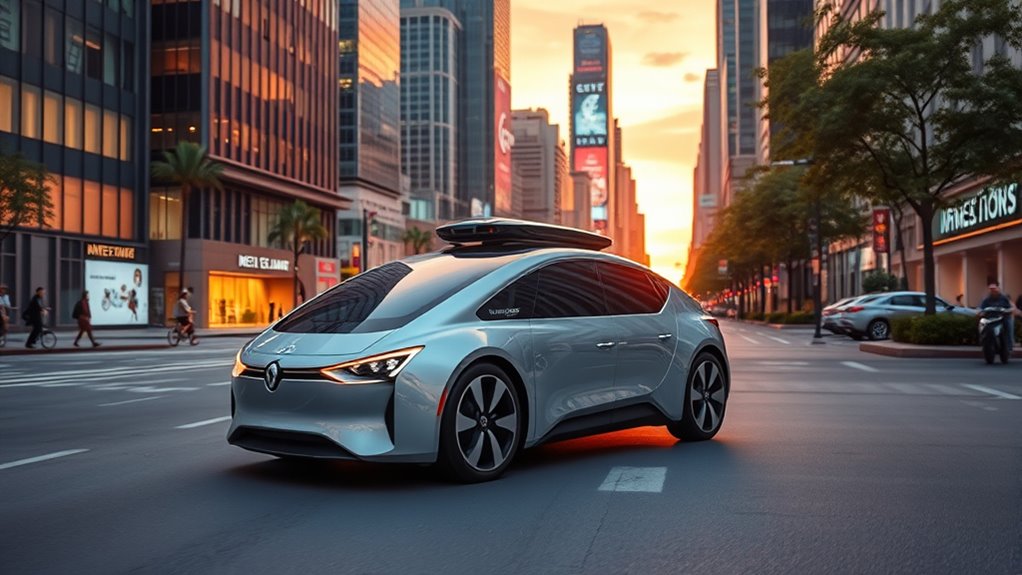The future of autonomous vehicles looks promising, aiming to make transportation safer, more efficient, and more accessible. Advances in technology will continue to improve responsiveness, safety, and integration into daily life. However, ethical, legal, and societal challenges must be addressed to gain public trust. Ongoing efforts by governments and industry aim to establish clear regulations and standards. If you want to explore how these developments will impact you personally, stay with us to learn more.
Key Takeaways
- Technological advancements will improve responsiveness, safety, and integration of autonomous vehicles into daily life.
- Ethical and moral considerations will shape programming, impacting societal trust and acceptance.
- Regulatory frameworks must evolve globally to ensure safety, accountability, and legal clarity.
- Society faces challenges in balancing innovation with privacy, fairness, and security concerns.
- Collaboration among governments, industry, and communities is essential for responsible deployment and future progress.

Autonomous vehicles are rapidly transforming the way we think about transportation, promising safer, more efficient, and more convenient travel experiences. As you anticipate this shift, it’s important to recognize that the journey toward fully autonomous vehicles isn’t just about technology; it’s also about maneuvering complex ethical considerations and regulatory challenges. These elements play a critical role in shaping how quickly and smoothly autonomous vehicles become a part of everyday life.
When it comes to ethical considerations, you’re faced with questions that go beyond engineering and software. For example, if an autonomous vehicle must choose between protecting its passenger or pedestrians in an unavoidable accident, how should it decide? These moral dilemmas aren’t simple, and they demand careful thought from developers, regulators, and society at large. You need to contemplate not only the safety of all parties involved but also issues like privacy, data security, and accountability. Who’s responsible when an autonomous vehicle makes a mistake? How do you guarantee that these systems treat all users fairly, regardless of age, gender, or other factors? These questions highlight the importance of establishing clear ethical guidelines that guide the development and deployment of autonomous vehicles.
Ethical questions in autonomous vehicles demand careful thought on safety, fairness, privacy, and accountability.
Meanwhile, regulatory challenges are equally significant. As you push for widespread adoption, you’ll encounter a patchwork of laws and standards that vary by country, state, or even city. Creating a consistent regulatory framework requires cooperation among government agencies, industry leaders, and public stakeholders. You must address issues like vehicle certification, road usage policies, and cybersecurity measures to prevent hacking or malicious interference. Additionally, regulators need to keep pace with rapidly evolving technology, which can be difficult given bureaucratic processes and the need for thorough testing. Without clear regulations, autonomous vehicle manufacturers might face delays, legal uncertainties, or public distrust, which could slow down the integration of these vehicles into daily life. Furthermore, advancements in high refresh rates and low input lag are essential to improve the responsiveness and safety of autonomous driving systems.
Despite these hurdles, progress is ongoing. Governments and industry groups are working together to develop standards and policies that balance innovation with safety and ethics. For you, this means that the future of autonomous vehicles hinges on maintaining this delicate balance—advancing technology while addressing the societal questions and legal frameworks that ensure everyone’s safety and trust. As these discussions continue, you can expect that the integration of autonomous vehicles will become more seamless, paving the way for a transportation future that’s smarter, safer, and more responsible.
Frequently Asked Questions
How Will Autonomous Vehicles Impact Urban Infrastructure Development?
You’ll see autonomous vehicles reshape urban planning by reducing the need for parking spaces and allowing cities to redesign streets for pedestrians and green areas. This shift boosts infrastructure resilience, as fewer traffic demands lower congestion and pollution. You’ll need to adapt infrastructure to support these vehicles, integrating smart technology and flexible designs. Overall, autonomous vehicles will drive smarter, more sustainable urban development, making cities more efficient and livable for everyone.
What Are the Cybersecurity Risks Associated With Autonomous Vehicle Technology?
Imagine your vehicle suddenly losing control, hackers exploiting cybersecurity vulnerabilities and stealing sensitive data. You face risks like unauthorized access to your personal information, tampering with navigation, or disrupting traffic systems. These cybersecurity threats threaten data privacy and safety, making it essential to strengthen defenses. You must prioritize robust encryption, regular updates, and vigilant monitoring to protect your autonomous vehicle from malicious attacks and guarantee your journey remains secure.
How Will Autonomous Vehicles Affect Insurance Policies and Liability?
You’ll see insurance liability shift as autonomous vehicles become more common, prompting policy adjustments. With self-driving cars handling most driving tasks, insurers will likely reduce personal auto coverage and increase product liability policies. You might face different premiums based on your vehicle’s level of automation. As a driver, stay informed about changes in insurance policies, because your liability could change markedly as autonomous technology evolves and legal responsibilities shift.
What Are the Ethical Dilemmas Faced by Autonomous Vehicle Algorithms?
You face ethical dilemmas in autonomous vehicle algorithms involving moral decision making, such as prioritizing passenger safety over pedestrians. You also grapple with algorithm transparency, wanting clear insights into how decisions are made during critical moments. Balancing these concerns is challenging, as you must guarantee your vehicle’s algorithms make responsible choices without obscuring their processes, ultimately fostering trust and safety in autonomous driving technology.
How Will Autonomous Vehicles Influence Public Transportation Systems?
You might think autonomous vehicles will hurt public transportation, but they can actually enhance shared mobility options. By integrating autonomous tech, cities can reduce traffic congestion and offer more reliable, flexible transit services. This shift encourages people to choose shared rides over personal cars, making transportation more efficient and eco-friendly. Embracing autonomous vehicles now helps improve public transit, leading to smoother traffic flow and better access for everyone.
Conclusion
As you watch this highway of innovation unfold, autonomous vehicles become your trusted co-pilots guiding you toward a brighter, safer future. They’re like digital sultans steering a symphony of progress, transforming roads into rivers of possibility. With every mile, you’re riding the crest of a technological wave that promises smoother journeys and endless adventures. Embrace this ride, because the road ahead is paved with promise, waiting just beyond the horizon.









